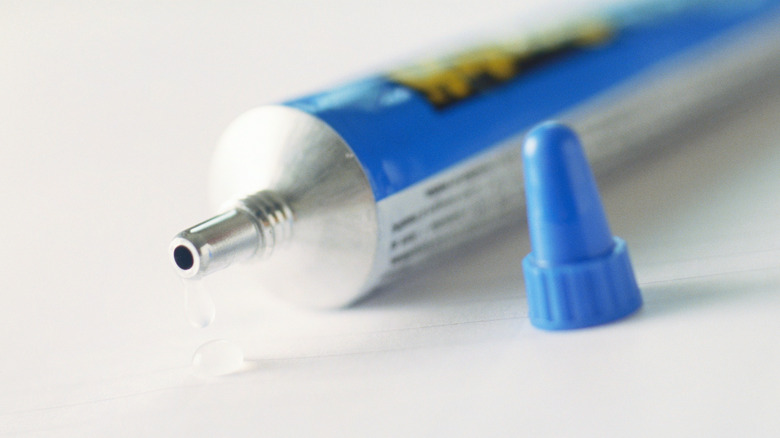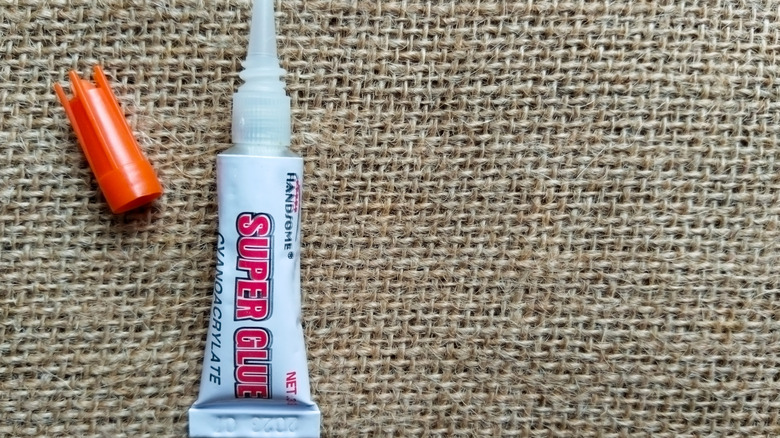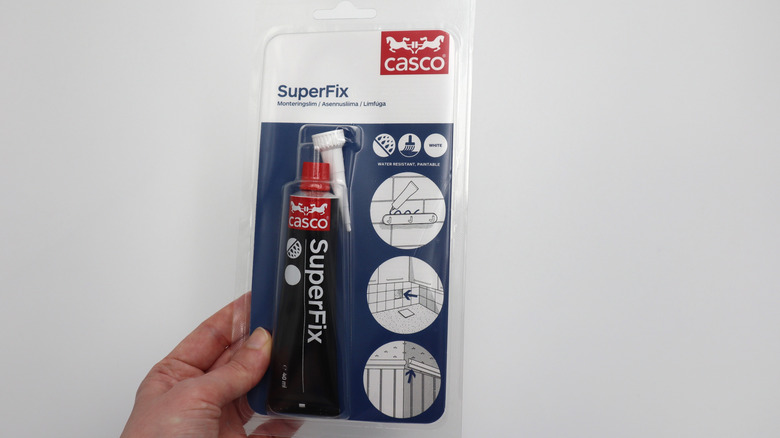Storage Mistakes That Are Shortening The Life Of Your Super Glue
It's no secret that there are a number of genius super glue tips and tricks out there that make DIY home projects and fixes so much easier to do. Known formally as cyanoacrylate adhesive, super glue has a reputation for being an extra strength, fast-acting bonding material, but one of its downsides is that it can be a little finicky when comes to shelf life. Nothing is more frustrating than realizing that your super glue tube has gone bad or hardened up in storage, even if you've only used it once, or it's still new in its tube. If you find yourself going through super glue at a fast pace simply because your glue doesn't survive storage, then it's likely you're making some common mistakes in how you store it, and importantly where you store it in your house.
Improper storage leads to a number of issues that shortens the life of your super glue, making it unusable for those clever home hacks. Your glue can dry out, making its adhesion ineffective, or the nozzle may keep clogging, preventing the proper flow of glue. New, unopened tubes of super glue are also at risk of going bad, despite staying sealed, as well. You can, however, avoid these mistakes by taking care of your super glue tubes, keeping these storage tricks in mind.
How to store open glue tubes
Open super glue tubes, in particular, are at risk of going bad due to a number of environmental storage issues, even if you make sure to recap your tube. Throwing it in a junk drawer near where you cook, for instance, won't make it last longer. Rather, you should take care to store the glue in a dry environment. Over time, super glue will polymerize, meaning the glue essentially adheres to itself, giving an impression that the tube is dried out or frozen. A dry environment prevents the glue from being exposed to additional moisture that can accelerate the polymerization process. That said, maintaining a cool storage environment is also key. Heat causes the glue to cure up too, so storing your super glue in the fridge is a nifty hack to lengthen its lifespan. If that's not possible, then storing the glue out of sunlight and in the dark will also help prevent heat from damaging it.
Between uses, it's additionally important to clean the nozzle of the tube or bottle to discourage build-up and to maintain a tight seal with the cap. Wipe the excess glue off the nozzle when it's still wet, or if the glue has dried too much, use acetone with a cotton pad to remove the accumulated adhesive. The overall lesson here with super glue storage and use is to keep external factors at bay, whether that's heat, light, or moisture. While some DIYers like to transfer super glue out of its original packaging to other usable containers, this can also exacerbate exposure to any of those unwanted elements.
Why are my unopened glue tubes going bad?
While opened super glue containers can last up to six to eight weeks in optimal storage conditions, unopened, sealed tubes can healthily last for almost a year in storage. But just because it's sealed in its original packaging doesn't mean that it can't also polymerize and go bad. In order to prevent this, stick to some similar environmental conditions that you want to keep open containers in too. Store these extra tubes in a dark, cooler temperature area to keep moisture away from the glue. Again, the fridge trick works here, but bare in mind to warm the glue up before use as exposing the glue at a cold temperature to the air will act as a catalyst for the polymerization process. Similarly, maintaining the glue in intensely low temperatures can lessen the strength of the glue's adhesion properties. For both opened and unopened containers in storage, it's really a trick of "Goldilocks and the Three Bears" — not too much, not too little, but just right.
Once you've taken the care to store your super glue properly so it lasts a good, long time, remember to avoid these common mistakes made when using super glue around the house as well. Also remember that there are some hidden downsides of using super glue to fix things around the house, so be sure to take caution when necessary. With care before, after, and during use, super glue can be your household best friend.


